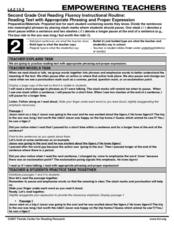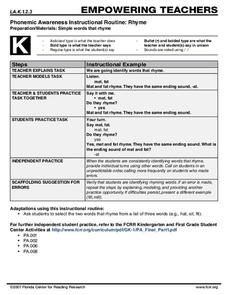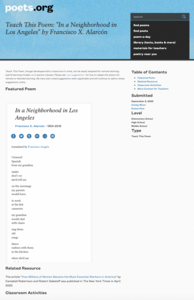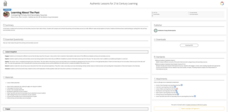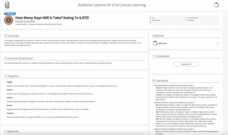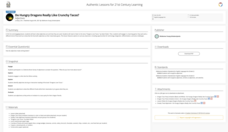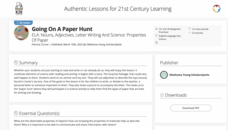Curated OER
Oral Reading Fluency: Reading Text with Appropriate Phrasing and Proper Expression
Understanding punctuation is a vital part of reading with appropriate phrasing and proper expression. Second graders take care to emphasize each sentence and phrase they are reading based on punctuation. They read as a class and then on...
Florida Center for Reading Research
Phonemic Awareness Instructional Routine: Rhyme
As a class, kindergarteners identify rhyming words. The teacher provides an example of a rhyming pair and explains why they rhyme. Individual learners then respond by saying a word that rhymes with a given word.
Curated OER
Vocabulary Instructional Routine: Identify and Sort Common Objects into Categories
Kindergarteners build vocabulary by learning about categorization. They discuss the attributes of living and non-living things. As a class, they view and sort pictures into each category. They discuss the word category and what it means.
Learning for Justice
Recognizing Discrimination
Empower scholars to take a peaceful stand against discrimination. The color of their clothes separates learners; then, only some are allowed to go to recess—this sparks a discussion about the concept of discrimination and how they felt...
Anti-Defamation League
Building a Foundation for Safe and Kind Online Communication
Put a spotlight on internet safety with a lesson designed to boost positive online communication. Scholars listen to the story, Yettele's Feathers by Joan Rothenberg, and answer questions. An emoji-themed handout challenges pupils to...
Anti-Defamation League
Nothing Wrong with a Three-Legged Dog: Discussion Guide for Grades 3-5
Scholars study the book, Nothing Wrong with a Three-Legged Dog by Graham McNamee to encourage an antibullying trend in their school and community. Chapters and themes examine bias, coping skills, how to respond to bullying, and being a...
Anti-Defamation League
Say Something: Discussion Guide for Grades 2-4
Empower pupils to stop bullying when they see or experience it with a lesson that showcases the book, Say Something by Margaret Paula Moss. After reading the tale and thoughtfully discussing its characters, they share their own...
Anti-Defamation League
The Name Jar: Discussion Guide for Grades Pre-K–1
A lesson spotlights the story, The Name Jar, by Yangsook Choi. After a read-aloud, the class retells the story using puppets or dress-up. They participate in a thoughtful discussion about the story, answer questions relating the book to...
Learning for Justice
What is Empathy?
Young scholars examine facial expressions to identify emotions, listen carefully to stories, and choose the appropriate reaction. Partners choose one story to rewrite, showing empathy for others.
Curated OER
Day of the Dead (Dia de los Muertos) - A Cultural Holiday: Color Exploration of Warm and Cool Colors
Young artists examine pictures from and discuss the holiday Día de los Muertos. The symbolic skull showcases the use of warm and cool colors. Color exploration allows learners to use coordinating colors to create two paper...
Curated OER
Mexican Folk Art: Sugar Skulls
Scholars use their knowledge of color to create vibrant skulls for Día de los Muertos. A thoughtful discussion brings forth information about the special holiday. A review of cool colors and warm colors prepares learners for the creation...
Academy of American Poets
Teach This Poem: "Tamales on Christmas" by Christian Robinson
A lesson spotlights the poem "Tamales on Christmas" by Christian Robinson. Scholars discuss their favorite foods and then examine a lively picture of a family preparing tamales. After listening to the poem twice, learners participate in...
Academy of American Poets
On "El Florida Room" by Richard Blanco
Scholars of all ages examine Richard Blanco's poem, "El Florida Room." Looking closely at pictures, pupils look for details that stand out to them, then read the poem. A whole-class discussion allows learners to reflect on what they...
Academy of American Poets
Teach This Poem: "In a Neighborhood in Los Angeles" by Francisco X. Alarcón
After sketching an essential person and reading an article, scholars read the poem "In a Neighborhood in Los Angeles" by Francisco X. Alarcón. They listen to the poem in English and Spanish and record lines that stand out to them. Small...
Academy of American Poets
Teach This Poem: "November 2: Día De Los Muertos" By Alberto Ríos
Scholars examine a colorful and detailed picture, then view an engaging video in preparation for reading the poem "November 2: Día De Los Muertos" by Alberto Ríos. Learners discuss their observations, feelings conveyed, and the...
Academy of American Poets
Teach This Poem: "The Teller of Tales" by Gabriela Mistral
The poem "The Teller of Tales" by Gabriela Mistral is the subject of a thoughtful lesson that allows scholars to listen to or read the poem, then discuss its meaning.
Anti-Defamation League
"What is it Like to be an Outsider?”: Building Empathy for the Experiences of Immigrants
This instructional activity highlights the struggles of immigrants and the importance of showing empathy. Beginning with a read-aloud of a book in another language and a poem, scholars take part in a thoughtful discussion. Then, the...
K20 LEARN
Learning About The Past: Comparing Primary And Secondary Sources
Scholars find out how primary and secondary sources help us learn the past. Beginning with an anchor chart, class members discuss and write the differences between primary and secondary sources; a card sort is added to the anchor chart...
K20 LEARN
Let's Mail Away!: Writing Letters
Scholars watch a video or listen to a story about writing letters, then discuss their importance. A scavenger hunt challenges them to identify common elements of friendly letters and create an anchor chart. Pupils write letters to a...
K20 LEARN
Let's Lasso the Moon: Phases of the Moon
A timelapse video hooks learners' attention to the phases of the moon. After discussing their observations, pupils use the Moon Giant website to view the moon on their birthday and complete a bar graph. The class creates an anchor chart...
K20 LEARN
How Many Days Will It Take? Eating To 6,972!: Partial Quotients
The story, How Many Jelly Beans? by Andrea Menotti introduces a lesson about partial quotients. Mathematicians practice rounding and multiplying, then work in small groups to connect those skills with division and partial quotients....
K20 LEARN
Grandmother, What A Big Culture You Have!: Cultural Characteristics
A word splash activity introduces scholars to the lesson's theme—cultural characteristics. First, in examining Little Red Riding Hood by The Brothers Grimm, learners highlight the cultural characteristics and then spot the differences in...
K20 LEARN
Do Hungry Dragons Really Like Crunchy Tacos?: Adjectives
Tacos are the theme of a lesson all about adjectives. Scholars list as many adjectives as possible to describe tacos and play a game of Not Like the Others before reading Dragons Love Tacos by Adam Rubin. Peers guess their favorite foods...
K20 LEARN
Going on a Paper Hunt: Nouns, Adjectives, Letter Writing and Science - Properties of Paper
A lesson introduces scholars to nouns and adjectives. After listening to a short story and practicing creating adjectives with a card sort, pupils go on a paper hunt to locate different types of paper, complete a chart with adjectives,...


